TEAL Professor Wins National Award for “Early Career Achievement”

Dr. Amy Wilson-Lopez, associate professor in the School of Teacher Education and Leadership, has been recognized with the 2017 Early Career Achievement Award from the Literacy Research Association.
Established in 1999, the award recognizes the efforts of scholars in the beginning stages of their career, including research, publications and other contributions, service, and teaching. The award also recognizes the scholar’s career trajectory and the future impact the award-winner will have on the field of literacy.
“I’m honored to receive this award,” Dr. Wilson-Lopez said. “There’s an added responsibility to come back and do more good work and more service. The committee didn’t just say congratulations on what I’ve done, but they are also looking forward to what I do in the future.”
Dr. Wilson-Lopez’ work on literacy, or the ability to understand and communicate information effectively, can be applied to a number of fields. Her research is focused primarily in the world of engineering.
At its core, Dr. Wilson-Lopez said, engineering is a process of seeing problems in a local or global community and finding solutions. “If the problem is material, then we can fix it with engineering,” she said.
As an illustration of how literacy applies to engineering, Dr. Wilson-Lopez shared an example of an instance where she worked with high school students who studied playgrounds in their community and then presented their findings to the city council. Their efforts to gather surveys, analyze the data, prepare a PowerPoint, and present persuasive information are all aspects of literacy.
Engineering is included in science standards nationwide, Dr. Wilson-Lopez said, but literacy in the field is low. Improving familiarity with engineering and how it works would likely lead to many more students pursuing STEM-related careers.
“Engineering is hard,” Dr. Wilson-Lopez said. “But if you understand that there’s a purpose to it and that the problems you’re solving are having a real impact on people’s lives, then the hard work is worth it.”
Students who don’t go on to become scientists can still benefit from increased engineering literacy, Dr. Wilson-Lopez said.
“You can obviously be successful without becoming an engineer,” Dr. Wilson-Lopez said, “but becoming more literate will help all students be more aware of their community and the problems facing it. Ultimately, it will help them become more conscious citizens.”

